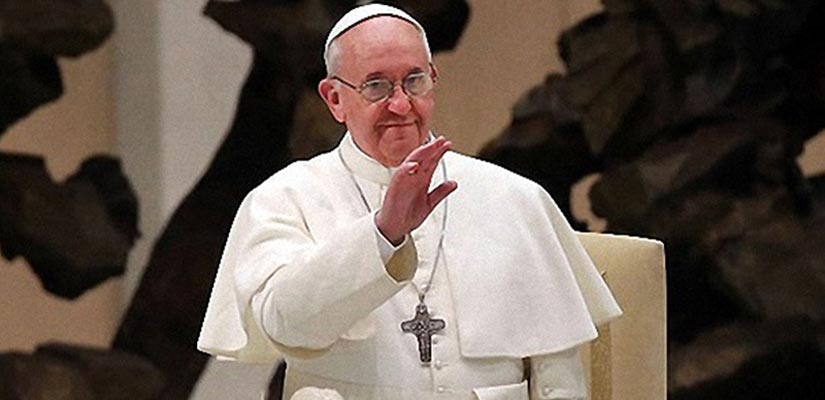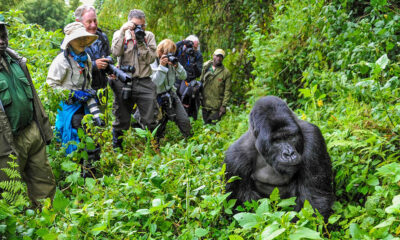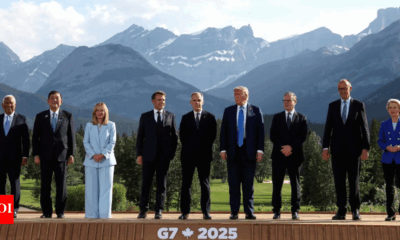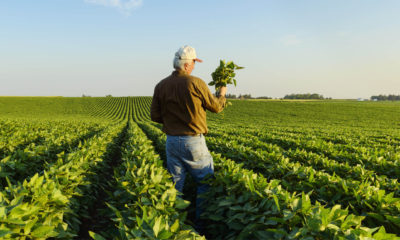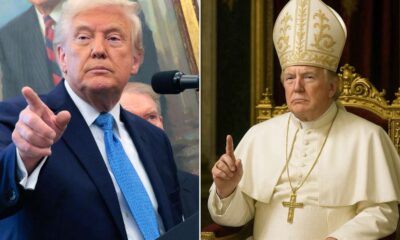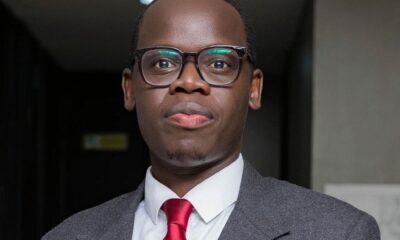human traffickingFeatures
Uganda sets record with third Papal visit
– Uganda hosts the Pope even before his native Argentina gets a chance
-His tenure has been characterized by humility
-He loves football.
His holiness Pope Francis (I) comes to Uganda to commemorate with Ugandans the 50th Anniversary of the canonization of the Uganda Martyrs, whose blood has been the seed of Christianity in Uganda.
Uganda was the only African country visited by Pope Paul VI during his 15-year reign at the Vatican. He came to Uganda in 1969. Next in line came Pope John Paul II who visited Uganda in February 1993.
Pope Paul VI, who canonized the 22 Uganda Martyrs in 1964, was the first Pope to come to Uganda 46 years ago, but his name still rings a loud bell in the memory of Ugandans, as noted by Archbishop of Kampala Dr Cyprian Kizito Lwanga.
Pope Paul travelled to Uganda in 1969, five years after canonizing the martyrs purposely to visit Namugongo Martyrs’ shrines and other holy places, especially those where other young martyrs were slaughtered like animals.
While in Uganda, Pope Paul VI also consecrated the altar in the minor Basilica erected at Karooli – Lwanga’s Martyrdom.
The only other African countries to have been visited by at least two reigning popes are Cameroon, Angola and Benin, all visited by popes, John Paul II and Benedict XVI.
Pope Francis’ visit to Uganda will be historic, since the land of the martyrs will host him even before his native Argentina gets a chance.
“It’s easier to organize a trip to the moon than a trip for the Pope to Africa,” American Archbishop Paul Marcinkus told Reuters a month before Pope Paul VI visited Uganda in 1969.
Pope Francis’ tenure has been characterized by humility and outspoken support of the world’s poor and marginalized people, and he has been actively involved in areas of political diplomacy and environmental advocacy.
Pope Francis will set foot here after 46 years of Pope Paul VI and 22 of Pope John Paul II on July 31, 1969 and February 7, 1993 respectively.
With Pope Visting Uganda, The Sunrise Newspaper here takes you through all what you need to know about Pope Francis.
Who is Pope Francis (I)
Born Jorge Mario Bergoglio he was elected the 266th pope of the Roman Catholic Church in March 2013, becoming Pope Francis. He is the first pope from America.
Born in Buenos Aires, Argentina, on December 17, 1936, Jorge Mario Bergoglio became Pope of the Roman Catholic Church took his papal name after St. Francis of Assisi of Italy.
Prior to his election as pope, Pope Francis served as archbishop of Buenos Aires from 1998 to 2013 (succeeding Antonio Quarracino), as cardinal of the Roman Catholic Church of Argentina from 2001 to 2013, and as president of the Bishops’ Conference of Argentina from 2005 to 2011.
Early Life and Education
According to his official Biography, As a young man, Bergoglio underwent surgery to remove part of one of his lungs due to a serious infection. He graduated from a technical school as a chemical technician before beginning training at the Diocesan Seminary of Villa Devoto. In March 1958, he entered the novitiate of the Society of Jesus.
He taught literature and psychology at Immaculate Conception College in Santa Fé in 1964 and 1965, and also taught the same subjects at the Colegio del Salvatore in Buenos Aires in 1966. He studied theology and received a degree from the Colegio of San José from 1967 to 1970, and finished his doctoral thesis in theology in Freiburg, Germany in 1986.
Pope Francis The Priest
Ordained as a priest in December 1969, Bergoglio began serving as Jesuit provincial of Argentina in 1973.
He has said that initially, his mother did not support his decision to enter the priesthood, despite the fact that she was a devout Catholic.
By the time he was ordained, however, she accepted his calling and asked for his blessing at the end of his ordination ceremony. He later returned to his alma mater, the Colegio of San José, where he served as rector (1980-86) as well as a professor of theology.
On May 20, 1992, Bergoglio was named titular bishop of Auca and auxiliary of Buenos Aires he was ordained into that post a week later.
In February 1998, he became archbishop of Buenos Aires, succeeding Antonio Quarracino. Three years later, in February 2001, he was elevated to cardinal by Pope John Paul II, named the cardinal-priest of Saint Robert Bellarmino. In 2005, he was named president of the Bishops’ Conference of Argentina, serving in that position until 2011.
After Pope John Paul II’s death in April 2005, Bergoglio reportedly received the second-most votes in the 2005 papal conclave Pope Benedict XVI (Joseph Ratzinger) was chosen as Pope John Paul’s successor.
Becoming Pope
On March 13, 2013, at the age of 76, Jorge Bergoglio was named the 266th pope of the Roman Catholic Church becoming the first citizen from the America, the first non-European and first Jesuit priest to be named pope, and adopting the name Pope Francis (he took the title after St. Francis of Assisi of Italy).
Prior to the 2013 papal conclave, Pope Francis had served as both archbishop and cardinal for more than 12 years.
The tone of his papacy, which has become admired globally, was established long before his elevation to the church’s highest position; however, when he was named to that post, the media quickly picked up on stories of his humility.
Addressing a crowd of tens of thousands in St. Peter’s Square, in the Vatican City in Rome, Italy, after his selection by the conclave, Pope Francis stated, “As you know, the duty of the conclave was to appoint a bishop of Rome. It seems to me that my brother cardinals have chosen one who is from faraway. . . . Here I am. I would like to thank you for your embrace.”
First International Visit as Pope
Pope Francis made his first international visit on July 22, 2013, when he arrived at the Galeão-Antonio Carlos Jobim International Airport in Rio de Janeiro, Brazil.
While in Rio, Pope Francis was on hand to celebrate World Youth Day. More than three million people attended the pontiff’s closing mass at the event. On his way back to Rome, Pope Francis surprised reporters traveling with him regarding his seemingly open stance on gay Catholics.
“If someone is gay and he searches for the Lord and has good will, who am I to judge?” His remarks were heralded by several gay and lesbian groups as a welcoming gesture by the Roman Catholic Church.
His Love for sports
As reported ealier in The Sunrise Sports, Pope Francis, Jorge Mario Bergoglio, is not above the passion his countrymen share for football and is an avid supporter of San Lorenzo, one of Argentina’s top clubs.
Bergoglio, who took the name Pope Francis when he was elected Pope, received his San Lorenzo membership card after saying mass at a sports complex near the team’s stadium.
Pope as Spiritual and World Leader
In September 2013, Pope Francis called for others to join him in praying for peace in Syria. The pontiff held a special vigil in St. Peter’s Square on September 7, which was attended by an estimated 100,000 people.
According to the Catholic News Service, Francis told the crowd that “When man thinks only of himself. . . and permits himself to be captivated by the idols of dominion and power. . . the door opens to violence, indifference, and conflict.” Pope Francis (I)
Later that month, Pope Francis gave a revealing interview to an Italian Jesuit publication called La Civiltà Cattolica. He explained that religious dialogue must be broader in scope, not simply focused on such issues as homosexuality and abortion. “We have to find a new balance; otherwise, even the moral edifice of the church is likely to fall like a house of cards, losing the freshness and fragrance of the Gospel,” the pope said.
In early December 2013, Pope Francis gave an “apostolic exhortation,” an address calling for big changes in the Catholic Church, including rethinking long-held but antiquated customs. “I prefer a Church which is bruised, hurting, and dirty because it has been out on the streets, rather than a Church which is unhealthy from being confined and from clinging to its own security,” he stated.
“I do not want a Church concerned with being at the center and then ends by being caught up in a web of obsessions and procedures.”
In September 2015, Pope Francis continued to stir up the status quo in the Catholic Church when he announced that priests around the world will be allowed to forgive the “sin of abortion” during a “year of mercy,” which starts December 8, 2015 and ends November 20, 2016.
He added: “The forgiveness of God cannot be denied to one who has repented, especially when that person approaches the Sacrament of Confession with a sincere heart in order to obtain reconciliation with the Father.
Pope as Environmental Activist
In June 2015, Pope Francis spoke out about the environment. He released a 184-page , a type of Papal message, warning of the dangers of climate change. In this letter, entitled “Laudato Si,” Pope Francis wrote: “If present trends continue, this century may well witness extraordinary climate change and an unprecedented destruction of ecosystems, with serious consequences for all of us.”
Pope Francis on education initiative for refugee children and youth
Pope Francis has long urged Catholics to welcome refugees, saying the world is currently suffering from a “globalization of indifference,” ignoring those who cry out for mercy.
Why Security is Doubled for Papal Visit in Uganda
The Pope’s security is a major concern because there have been two assassination attempts on popes in the recent past.
The first major one was in 1970 when Pope Paul VI visited the Philippines. A Bolivian painter, Benjamin Mendoza, attacked him with a dagger, wounding him in the chest at Manila airport as the Pope walked down an airport receiving line.
Then in May 1981 at St Peter’s Square in Rome, Turkish Ali Agca fired several shots at Pope John Paul II, two of which struck the pontiff who miraculously survived.
Famous quotes by Pope Francis
On war and death
“Even today we raise our hand against our brother… We have perfected our weapons, our conscience has fallen asleep, and we have sharpened our ideas to justify ourselves as if it were normal we continue to sow destruction, pain, death. Violence and war lead only to death”
On Terrorism
“Human rights are not only violated by terrorism, repression or assassination, but also by unfair economic structures that creates huge inequalities”
About Church
“I prefer a church which is bruised, hurting and dirty because it has been out on the streets, rather than a church which is unhealthy from being confined and from clinging to its own security.”
Comments



